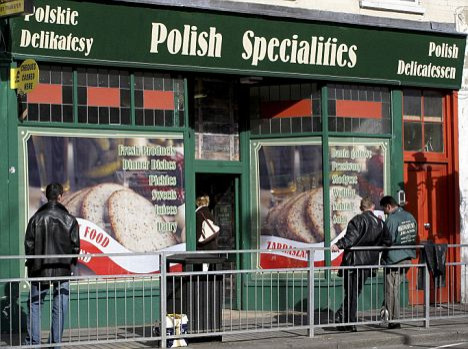The Second-Most Commonly Spoken Language In England Is … Polish

The second-most commonly spoken language in England is now Polish, according to 2011 census data released by the Office of National Statistics, reflecting the huge wave of migration from Poland over the past decade.
More than half a million (546,000) residents of England and Wales speak Polish as their first language – making it the second-biggest tongue in England (behind English, of course, which is spoken by more than 56-million people). Polish is the third-most popular language spoken in Wales, behind English and Welsh.
Thereafter, in terms of popularity, followed languages from South Asia – Punjabi, Urdu, Bengali, Gujarati – reflecting Britain’s large Indian-Pakistani immigrant population.
The ONS also noted that in 1 million households, English is not the primary language. About 1.7 million people said they could not speak English very well, and estimated 138,000 people in the country spoke no English at all.
On the whole, 22 percent of residents of Greater London do not use English as the primary language in their household.
Ealing, a district in West London, had the largest percentage of Polish speakers – accounting for 6 percent of the total.
Numbering at least 800,000, Poles are the second-biggest foreign community in Britain after only the Indians.
The Polish presence in Britain seems to have come out of nowhere – because Poles are white Europeans and overwhelmingly Christian, the Guardian newspaper has described them as an “invisible minority.”
As with many other immigration narratives, the second generation feels they are more British then Polish.
Ania Ready, a Polish immigrant who lives in Oxford, told the Guardian: "In my experience Poles … mix well in British society and they don't tend to live or function in ghettos."
However, as the ONS study suggests, many older Poles do not speak English and do not seek to integrate, following the familiar example of immigrants from India and Pakistan.
Agata Pyzik, a Polish columnist for the Guardian, recently wrote: “With little prospect of work back home and a free NHS in the UK, more Polish women are choosing to stay here to have children. You can now hear Polish on the streets of nearly every British city. … Those [Poles] who decided to come after 2004 are mainly working class and did so just to work. There were no jobs in Poland, and even a low-paid job in Britain could pay for the rest of the family to live back home. With time, they became attached to the UK.”
She noted that the massive emigration of Poles to the UK inspired Polish Prime Minister Donald Tusk to call Poland the "new Ireland," while the Polish media describes the émigrés the "lost generation".
© Copyright IBTimes 2024. All rights reserved.











